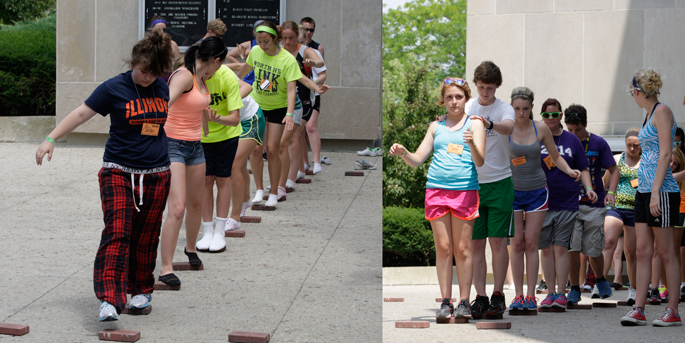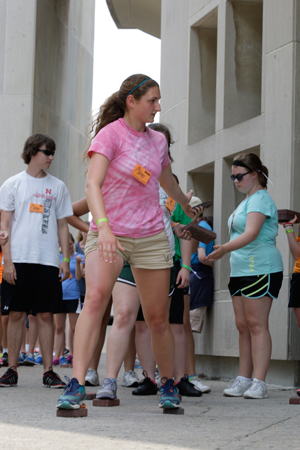
While conducting is an important part of the Bands of America Drum Major Institute at Summer Symposium, leadership training is key to the DMI curriculum. Each day, the DMI Faculty empowers campers to become effective leaders of their own band through varying lessons and exercises. I was intrigued by one of these exercises outside Pruis Hall and decided to stick around to watch our young leaders at work.
James Stephens, DMI Faculty member and Associate Director of Bands at Broken Arrow High School, created the exercise “The Brick Game” and presented it to the drum majors with fellow faculty member Kim Shuttlesworth, Director of Bands at James Bowie High School and former drum major of the University of Texas at Austin “Showband of the Southwest.”
 The challenge: Each group of approximately 15 students is provided 10 bricks in order to travel a path of 20 feet without touching the ground. All of the bricks start on one side, and one member must be touching each brick at all times until they cross the path. If any group member touches the ground or leaves a brick unattended, they must start over. Groups are given a couple minutes to devise a plan; however, they cannot speak during the exercise. Although nonverbal communication is key in “The Brick Game,” there are many more attributes of effective leaderership required to be successful in this exercise.
The challenge: Each group of approximately 15 students is provided 10 bricks in order to travel a path of 20 feet without touching the ground. All of the bricks start on one side, and one member must be touching each brick at all times until they cross the path. If any group member touches the ground or leaves a brick unattended, they must start over. Groups are given a couple minutes to devise a plan; however, they cannot speak during the exercise. Although nonverbal communication is key in “The Brick Game,” there are many more attributes of effective leaderership required to be successful in this exercise.
Many groups first attempted to cross the bricks individually without assistance; however, many fell or left bricks unattended. Quickly, members began to use each other for support and assistance. An active awareness of each other and their surroundings proved valuable to the groups. Patience was one of the most important attributes for the “The Brick Game.” The group I watched required several tries before reaching the goal. While it was easy to become frustrated after a failed attempt, patience and perseverance prevailed.
Unlike most leadership exercises where the difficulty lies in finding the solution, the difficulty in this exercise was completing the exercise once the solution is found. Very quickly, groups had successful plans to get across the path; however, executing the plan proved very difficult and required that each member commit to the plan. The success of the group falls on every single member, not just one leader. Just like in an ensemble or on the field, the weak link was easily visible. Positive reinforcement and support helped the entire group achieve the challenge.
 In the end, only two of nine groups were successful. It took participants nearly 30 minutes to get the entire group across the path. Once one group was successful, I was surprised at the reaction—they clapped and celebrated for themselves politely, but quickly stopped to encourage the other groups. While friendly competition served as the initial motivation, the drum majors remained committed to each other. The unsuccessful groups did not seem too discouraged, as they recognized the leadership skills learned during the exercise.
In the end, only two of nine groups were successful. It took participants nearly 30 minutes to get the entire group across the path. Once one group was successful, I was surprised at the reaction—they clapped and celebrated for themselves politely, but quickly stopped to encourage the other groups. While friendly competition served as the initial motivation, the drum majors remained committed to each other. The unsuccessful groups did not seem too discouraged, as they recognized the leadership skills learned during the exercise.
The Drum Major Institute’s core teaching principles include Character, Content, Communication and Chemistry, and “The Brick Game” reflected these principles: the patience and persistence revealed the character required for an effective drum major and leader; the requirement for all to commit was similar to the content of marching ensembles; all forms of communication, including nonverbal, were integral; the awareness and support between group members reflected the chemistry of a successful community.
I am very glad I decided to stop by the Drum Major Institute. The leadership and life skills displayed in just one exercise were astonishing, and I am confident that each of the participants will become an excellent drum major, leader and human in his or her own community.
-Seth
Seth Williams is currently Development Coordinator at Music for All. Seth is no stranger to Music for All and Bands of America – first as a participant and as an intern in Development and Participant Relations. He is a graduate of Butler University and previously worked in the Broadway theatre industry in New York. A proud alumnus of “The Centerville Jazz Band,” Seth is likely the biggest band nerd he knows.



